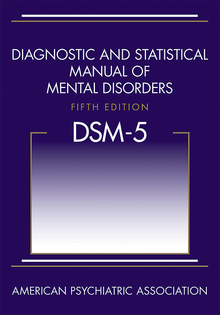
Back الدليل التشخيصي والإحصائي للاضطرابات النفسية (الطبعة الخامسة) Arabic دي إس إم-5 ARY DSM-5 Azerbaijani DSM-5 Catalan DSM-5 German DSM-5 Greek DSM-5 Esperanto DSM-5 Spanish دیاسام-۵ Persian DSM-5 French
 | |
| Author | American Psychiatric Association |
|---|---|
| Country | United States |
| Language | English |
| Series | Diagnostic and Statistical Manual of Mental Disorders |
| Subject | Classification and diagnosis of mental disorders |
| Published | May 18, 2013 |
| Media type | Print (hardcover, softcover); e-book |
| Pages | 947 |
| ISBN | 978-0-89042-554-1 |
| OCLC | 830807378 |
| 616.89'075 | |
| LC Class | RC455.2.C4 |
| Preceded by | DSM-IV-TR |
| Followed by | DSM-5-TR |
| Text | DSM-5 online |
The Diagnostic and Statistical Manual of Mental Disorders, Fifth Edition (DSM-5), is the 2013 update to the Diagnostic and Statistical Manual of Mental Disorders, the taxonomic and diagnostic tool published by the American Psychiatric Association (APA). In 2022, a revised version (DSM-5-TR) was published.[1] In the United States, the DSM serves as the principal authority for psychiatric diagnoses.[2] Treatment recommendations, as well as payment by health care providers, are often determined by DSM classifications, so the appearance of a new version has practical importance. However, not all providers rely on the DSM-5 for planning treatment as the ICD's mental disorder diagnoses are used around the world[3] and scientific studies often measure changes in symptom scale scores rather than changes in DSM-5 criteria to determine the real-world effects of mental health interventions.[4][5][6][7] The DSM-5 is the only DSM to use an Arabic numeral instead of a Roman numeral in its title, as well as the only living document version of a DSM.[8]
The DSM-5 is not a major revision of the DSM-IV-TR, and the two have significant differences. Changes in the DSM-5 include the re-conceptualization of Asperger syndrome from a distinct disorder to an autism spectrum disorder; the elimination of subtypes of schizophrenia; the deletion of the "bereavement exclusion" for depressive disorders; the renaming and reconceptualization of gender identity disorder to gender dysphoria; the inclusion of binge eating disorder as a discrete eating disorder; the renaming and reconceptualization of paraphilias, now called paraphilic disorders; the removal of the five-axis system; and the splitting of disorders not otherwise specified into other specified disorders and unspecified disorders.
Many authorities criticized the fifth edition both before and after it was published. Critics assert, for example, that many DSM-5 revisions or additions lack empirical support; that inter-rater reliability is low for many disorders; that several sections contain poorly written, confusing, or contradictory information; and that the pharmaceutical industry may have unduly influenced the manual's content, given the industry association of many DSM-5 workgroup participants.[9] The APA itself has published that the inter-rater reliability is low for many disorders, including major depressive disorder and generalized anxiety disorder.[10]
- ^ American Psychiatric Association, ed. (2022). Diagnostic and Statistical Manual of Mental Disorders, Fifth Edition, Text Revision (DSM-5-TR). Washington, DC, USA: American Psychiatric Publishing. ISBN 978-0-89042-575-6.
- ^ Clark LA, Cuthbert B, Lewis-Fernández R, Narrow WE, Reed GM (2017). "Three Approaches to Understanding and Classifying Mental Disorder: ICD-11, DSM-5 , and the National Institute of Mental Health's Research Domain Criteria (RDoC)". Psychological Science in the Public Interest. 18 (2): 72–145. doi:10.1177/1529100617727266. ISSN 1529-1006. p. 80:
A survey of nearly 5,000 international psychiatrists ... [found that] DSM-IV use was nearly universal in the United States.
- ^ First M, Rebello T, Keeley J, Bhargava R, Dai Y, Kulygina M, Matsumoto C, Robles R, Stona A, Reed G (June 2018). "Do mental health professionals use diagnostic classifications the way we think they do? A global survey". World Psychiatry. 17 (2): 187–195. doi:10.1002/wps.20525. PMC 5980454. PMID 29856559.
- ^ Cipriani A, Furukawa TA, Salanti G, Chaimani A, Atkinson LZ, Ogawa Y, Leucht S, Ruhe HG, Turner EH, Higgins JP, Egger M, Takeshima N, Hayasaka Y, Imai H, Shinohara K, Tajika A, Ioannidis JP, Geddes JR (April 7, 2018). "Comparative efficacy and acceptability of 21 antidepressant drugs for the acute treatment of adults with major depressive disorder: a systematic review and network meta-analysis". Lancet. 391 (10128): 1357–1366. doi:10.1016/S0140-6736(17)32802-7. PMC 5889788. PMID 29477251.
- ^ Bandelow B, Reitt M, Röver C, Michaelis S, Görlich Y, Wedekind D (July 2015). "Efficacy of treatments for anxiety disorders: a meta-analysis". International Clinical Psychopharmacology. 30 (4): 183–192. doi:10.1097/YIC.0000000000000078. ISSN 0268-1315. PMID 25932596. S2CID 24088074.
- ^ Schneider-Thoma J, Chalkou K, Dörries C, Bighelli I, Ceraso A, Huhn M, Siafis S, Davis JM, Cipriani A, Furukawa TA, Salanti G, Leucht S (February 26, 2022). "Comparative efficacy and tolerability of 32 oral and long-acting injectable antipsychotics for the maintenance treatment of adults with schizophrenia: a systematic review and network meta-analysis". Lancet. 399 (10327): 824–836. doi:10.1016/S0140-6736(21)01997-8. ISSN 0140-6736. PMID 35219395. S2CID 247087411.
- ^ Gartlehner G, Crotty K, Kennedy S, Edlund MJ, Ali R, Siddiqui M, Fortman R, Wines R, Persad E, Viswanathan M (October 2021). "Pharmacological Treatments for Borderline Personality Disorder: A Systematic Review and Meta-Analysis". CNS Drugs. 35 (10): 1053–1067. doi:10.1007/s40263-021-00855-4. ISSN 1172-7047. PMC 8478737. PMID 34495494.
- ^ Wakefield JC (May 22, 2013). "DSM-5: An Overview of Changes and Controversies". Clinical Social Work Journal. 41 (2): 139–154. doi:10.1007/s10615-013-0445-2. ISSN 0091-1674. S2CID 144603715.
- ^ Welch S, Klassen C, Borisova O, Clothier H (2013). "The DSM-5 controversies: How should psychologists respond?". Canadian Psychology. 54 (3): 166–175. doi:10.1037/a0033841.
- ^ Regier D, Narrow W, Clarke D, Kraemer H, Kuramoto S, Kuhl E, Kupfer D (2013). "DSM-5 Field Trials in the United States and Canada, Part II: Test-Retest Reliability of Selected Categorical Diagnoses". American Journal of Psychiatry. 170 (1): 59–70. doi:10.1176/appi.ajp.2012.12070999. PMID 23111466.
© MMXXIII Rich X Search. We shall prevail. All rights reserved. Rich X Search